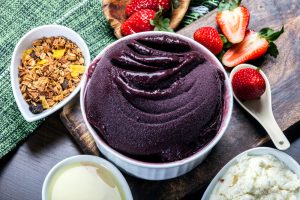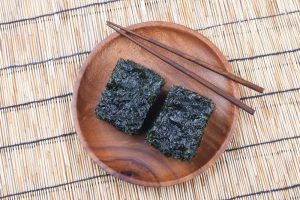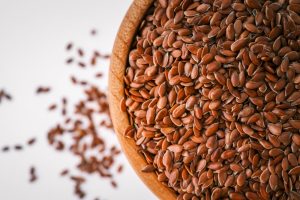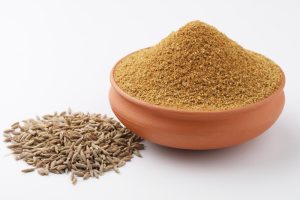BodyArmor drinks can support weight loss only when used strategically—mainly by replacing higher-calorie beverages like soda.
They don’t directly cause fat loss, but lower-calorie versions like Lyte and Zero Sugar can help reduce overall sugar and calorie intake.
Keep reading for a full breakdown of how different BodyArmor products affect your weight loss efforts.
Understanding BodyArmor’s Product Lines: What’s Actually in the Bottle?
Not all BodyArmor drinks are created equal—especially if you're trying to manage your weight.
The brand offers several product lines that vary widely in calorie count, sugar content, and sweetener type, which makes choosing the right one essential depending on your goals.
The most important distinction between BodyArmor products lies in how many calories and grams of sugar each one delivers.
For someone aiming to lose weight, this can make a major difference in daily calorie totals.
The Original BodyArmor, for example, comes in at around 120 calories and 29 grams of sugar per 16-ounce bottle.
That sugar load equals nearly half of the recommended daily limit for added sugars—and that’s just from one drink.
While this version may be useful for athletes needing quick energy and electrolyte replenishment, it’s a poor choice for those looking to cut calories or reduce sugar intake.
In contrast, BodyArmor Lyte offers a much more weight-loss-friendly profile.
With only about 15 calories per bottle, it swaps out sugar for stevia and erythritol, two no-calorie sweeteners.
This makes it far easier to stay within a calorie deficit without sacrificing hydration or flavor. It still contains electrolytes and coconut water, so you’re not missing out on the core benefits.
Even more stripped down is BodyArmor Zero Sugar, which contains zero calories, zero sugar, and zero carbs.
It’s also caffeine-free and still delivers key electrolytes, making it a solid option for hydration with no impact on your calorie intake.
If you’re actively tracking macros or working within a strict nutrition plan, this version gives you maximum flexibility.
Then there’s BodyArmor Edge, which adds caffeine and extra sugar, pushing it even further away from weight-loss-friendly territory.
It’s designed for high-performance energy needs—not casual hydration or dieting support.
Ultimately, product choice plays a big role in whether BodyArmor helps or hinders your weight loss progress.
Swapping out a daily bottle of the Original or Edge version for Lyte or Zero Sugar can easily save you over 100 calories a day, without compromising hydration or electrolyte intake.
Over time, that simple change can contribute meaningfully to your overall calorie reduction efforts.
For those focused on weight loss, it’s not just about drinking something labeled “healthy”—it’s about knowing exactly what’s in your bottle and choosing the version that aligns with your goals.
Can BodyArmor Support Weight Loss? Here’s the Real Story
It’s easy to assume that a drink marketed for athletes must automatically support weight loss—but that’s not exactly how it works.
BodyArmor can play a supporting role in your weight loss efforts, but it’s important to understand how and when it actually helps.
First, it’s important to be clear: BodyArmor drinks don’t contain any thermogenic ingredients.
That means they don’t directly increase your metabolism or stimulate fat burning the way some weight loss supplements claim to do.
If you’re hoping for a metabolism boost just from sipping on one of these drinks, you won’t find it here.
What BodyArmor can do, though, is help reduce your overall calorie intake—but only if you choose the right version and use it strategically.
For example, swapping out a sugary soda or sports drink for BodyArmor Lyte or Zero Sugar can make a noticeable difference.
These options have little to no calories and no added sugars, yet still offer flavor and hydration, which can help satisfy cravings and keep you from reaching for higher-calorie drinks.
Hydration itself also plays an underrated role in weight management.
Often, people confuse thirst for hunger, which can lead to unnecessary snacking.
Staying well-hydrated with low- or no-calorie beverages like BodyArmor Lyte or Zero Sugar may help reduce those mistaken hunger signals.
It’s not a magic fix, but it’s a practical way to avoid mindless eating.
That said, no version of BodyArmor will help you lose weight unless you’re also managing your total calorie intake and staying active.
It’s a supportive tool—not a solution on its own.
Think of it like a small upgrade: switching from a 150-calorie soda to a 15-calorie Lyte bottle every day saves you 135 calories.
Over time, that reduction adds up, but only when it’s paired with broader habits like portion control, regular movement, and consistent nutrition choices.
In short, BodyArmor can support your weight loss efforts—but it won’t do the work for you.
Choose the low-calorie versions, use them as smarter replacements for higher-calorie drinks, and make sure they’re just one piece of a larger, sustainable strategy.
Electrolytes and Hydration: What Role Do They Play in Weight Management?
Hydration is often overlooked in weight loss conversations, but it plays a bigger role than most people realize. Electrolyte balance—especially getting enough potassium and sodium—can influence how well your body holds water, regulates appetite, and maintains energy throughout the day.
Hydration Helps You Eat Smarter (and Less)
When you're dehydrated, your body can send mixed signals that feel a lot like hunger. That confusion can lead to unnecessary snacking or larger meal portions. Drinking enough fluids throughout the day helps curb those false hunger cues and makes it easier to stick to a calorie deficit. This is where BodyArmor, especially the Lyte and Zero Sugar versions, can be useful—they offer flavorful hydration without the extra calories.
Potassium: A Quiet Workhorse
One of BodyArmor’s standout ingredients is potassium, with each bottle delivering around 530 mg.
Potassium plays a key role in fluid balance, muscle function, and even reducing bloating—something many people appreciate during weight loss efforts.
Unlike sodium-heavy sports drinks, which are designed for extreme sweat loss, potassium-rich options like Lyte and Zero Sugar support everyday hydration without adding unnecessary salt or sugar to your diet.
Sodium: When More Is Actually Better (But Not for Everyone)
Sodium isn't the enemy—it’s essential for fluid retention and nerve function—but most people get plenty from food alone.
The Original BodyArmor contains just 30 mg of sodium, which is quite low.
However, the Flash IV version boosts that to about 530 mg, making it more appropriate for high-intensity workouts or long-duration exercise where sodium loss through sweat is significant.
If you're not regularly engaging in heavy training or sweating for extended periods, you probably don’t need that extra sodium.
For most weight-conscious individuals doing moderate activity, the lower-sodium, potassium-focused formulas like Lyte and Zero Sugar are more aligned with everyday needs.
The Takeaway on Electrolytes and Weight Goals
While electrolytes themselves won’t cause weight loss, staying well-hydrated with the right balance of potassium and sodium supports the bigger picture: more consistent energy, fewer cravings, and less water retention.
BodyArmor offers a more natural source of electrolytes than many traditional sports drinks, which often rely on higher sugar and artificial additives.
So, if you're using BodyArmor to support your hydration habits, the best approach is to choose a formula that matches your activity level.
For everyday hydration and weight management, stick with Lyte or Zero Sugar.
Save Flash IV or other sodium-boosted options for long workouts or recovery from significant sweat loss.
Ingredient Watch: What’s Clean and What Might Cause Concerns?
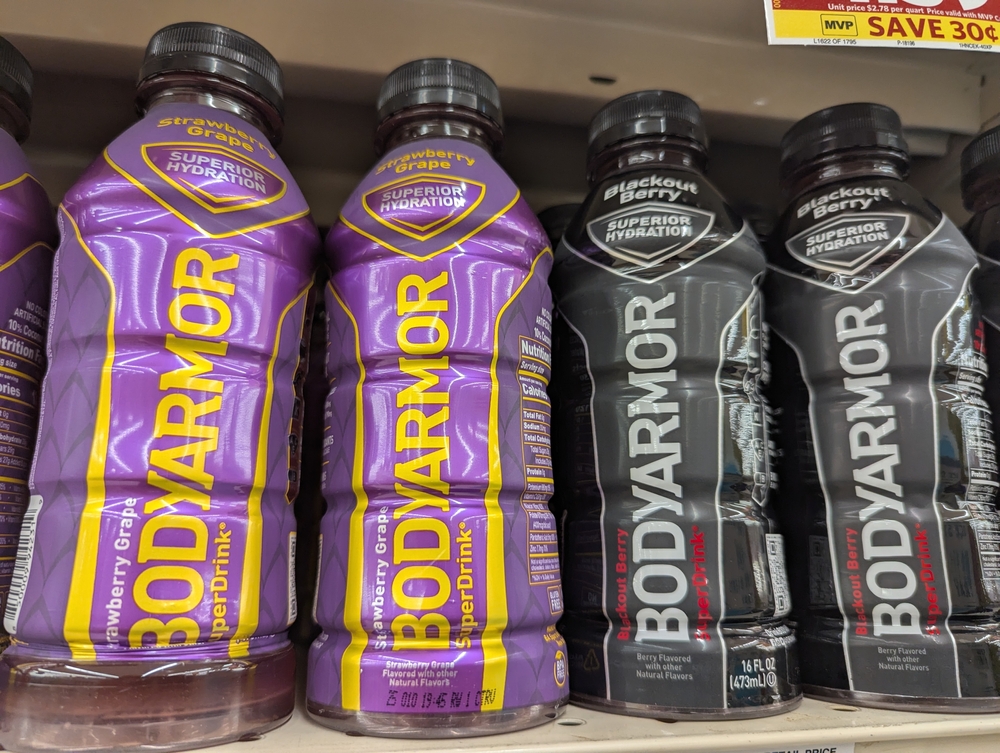
When evaluating whether a drink fits into a healthy weight loss plan, it’s not just about the calories or sugar—it’s also about what else is in the bottle.
BodyArmor includes several ingredients that are generally seen as clean and natural, but there are a few others that may raise questions depending on your personal preferences or sensitivities.
What’s in the “Clean” Column
Most BodyArmor drinks, particularly the Lyte and Zero Sugar versions, score well when it comes to clean ingredients.
They use filtered water, coconut water concentrate, and natural colorings derived from fruits and vegetables rather than synthetic dyes.
These choices appeal to consumers who are avoiding artificial additives but still want something flavorful and hydrating.
In addition, the lower-calorie options avoid artificial sweeteners like aspartame or sucralose, which are common in many diet drinks.
Instead, they rely on stevia and erythritol—two plant-based, no-calorie sweeteners that tend to be better tolerated by those seeking natural alternatives.
What to Watch Out For
That said, there are a few ingredients worth paying closer attention to.
First is citric acid, which is widely used as a preservative.
While it's common and generally recognized as safe, some people with sensitive stomachs or acid reflux may find it irritating.
Its production can also involve mold or yeast-based fermentation, which is a concern for those with certain sensitivities or allergies.
Another area of concern is the use of “natural flavors.”
Despite the name, this is a catch-all term that doesn’t offer much clarity.
It can include dozens of compounds derived from natural sources, but manufacturers aren’t required to disclose exactly what they are.
If you prefer complete transparency in your food and drinks, or have known reactions to specific flavoring agents, this lack of detail might be frustrating.
Additionally, while erythritol and stevia are widely considered safe, they can cause digestive discomfort in some people—especially when consumed in larger amounts.
Erythritol, a sugar alcohol, may lead to bloating or gas, while stevia can sometimes leave a bitter aftertaste or trigger mild GI upset in sensitive individuals.
Reading Labels and Knowing Your Limits
If you’re using BodyArmor regularly—especially as part of a weight loss plan—it’s worth checking the label of the specific version you’re drinking.
Even within the same brand, ingredients can vary slightly from one line to another.
The best approach is to listen to your body: if you notice any bloating, upset stomach, or unusual cravings after drinking it, try switching to a different version or spacing out your intake.
For most people, the ingredients in BodyArmor won’t cause problems.
But for anyone with specific dietary needs or sensitivities, being aware of what’s inside—and how your body reacts—is an important part of making it work for your goals.
When (and How) to Use BodyArmor for Weight Loss Goals
Drinking BodyArmor can be helpful during a weight loss journey, but timing and frequency matter.
Using the right version at the right time ensures you get the hydration and electrolyte support you need—without unintentionally stalling your progress.
If your main goal is cutting calories and managing sugar intake, BodyArmor Lyte or Zero Sugar are the versions to focus on.
These are best used as occasional alternatives to soda, juice, or traditional sports drinks, especially when you’re craving something flavored but don’t want the extra calories.
Swapping even one bottle of soda per day for BodyArmor Lyte could cut about 100–150 calories without sacrificing taste, which makes a real difference over time.
However, these drinks shouldn’t necessarily replace your daily hydration routine.
Water is still your best option for regular fluid intake, particularly if your activity level is moderate and your diet is already balanced.
BodyArmor is best treated as a supplemental drink—not a replacement for all your fluids.
For athletes or individuals who sweat heavily during long or intense workouts,
BodyArmor Flash IV may serve a specific purpose. Its higher sodium content (~530 mg) helps replenish what’s lost through sweat, which is critical after endurance activities or training in hot conditions.
In those situations, using Flash IV post-workout can aid recovery and help maintain fluid balance.
But outside of that use case, it’s not a match for everyday weight-loss efforts due to the added sodium and sugar.
On the other hand, BodyArmor SportWater—which focuses purely on electrolytes and hydration with zero calories—is ideal for those who want a clean option for hydration support.
It’s especially useful during fasted workouts or low-intensity cardio, where you want hydration without adding any caloric intake.
In short, your choice of BodyArmor product should reflect your activity level, dietary goals, and how your body responds to certain ingredients.
If you’re mostly sedentary or moderately active, occasional use of Lyte or Zero Sugar is a smarter path.
If you’re training hard and sweating often, Flash IV might serve a specific need—but it shouldn’t be your default.
To get the most out of BodyArmor as part of a weight management plan:
- Use it to replace—not add to—your calorie intake.
- Listen to your body’s signals around sweetness and digestion.
- Match your drink to your actual hydration needs, not just what sounds healthy on the label.
Consistency in your broader habits still matters most, but thoughtful use of BodyArmor can support the process when used with intention.
Actionable Tips
BodyArmor can play a useful role in a weight loss plan, but only if it's used with clear intent and paired with other healthy habits. It’s not a weight loss drink—it’s a hydration tool.
That distinction matters, and how you apply it can either support your goals or quietly work against them.
If you're currently drinking the Original version regularly, switching to Lyte or Zero Sugar is one of the easiest and most impactful changes you can make.
That simple swap saves about 100 calories and 29 grams of sugar per bottle, which adds up significantly over time without requiring major dietary changes.
Even small daily calorie reductions, when consistent, can support sustainable weight loss.
It’s also smart to pay attention to how your body reacts to specific ingredients.
Some people experience mild digestive discomfort from sugar alcohols like erythritol or intense sweetness from stevia.
If that’s you, reduce how often you drink these products or explore alternatives like electrolyte water or flavored seltzer.
Still, it’s important to zoom out: BodyArmor won’t make or break your results.
Weight loss is driven by total calorie intake, energy expenditure, and consistency.
These drinks might help curb sugar cravings or provide a more satisfying alternative to soda, but they’re not a replacement for real behavior change.
Keep water as your main drink, especially between meals.
Use BodyArmor Lyte or Zero Sugar to add variety, support hydration during workouts, or replace a sugary craving.
If you’re unsure about certain ingredients or how they affect your body—especially if you have a health condition or dietary restriction—consult a dietitian who can offer personalized guidance.
In the end, smart product choices like these are just one piece of the puzzle.
The real progress happens when you combine them with thoughtful eating, regular movement, and a plan that fits your lifestyle.
Conclusion
BodyArmor can support your weight loss efforts when you choose lower-calorie options like Lyte or Zero Sugar.
They're helpful for reducing sugar intake and staying hydrated, but they aren't a shortcut to fat loss.
Use them wisely, and focus on the bigger picture—calorie control, activity, and consistency.



